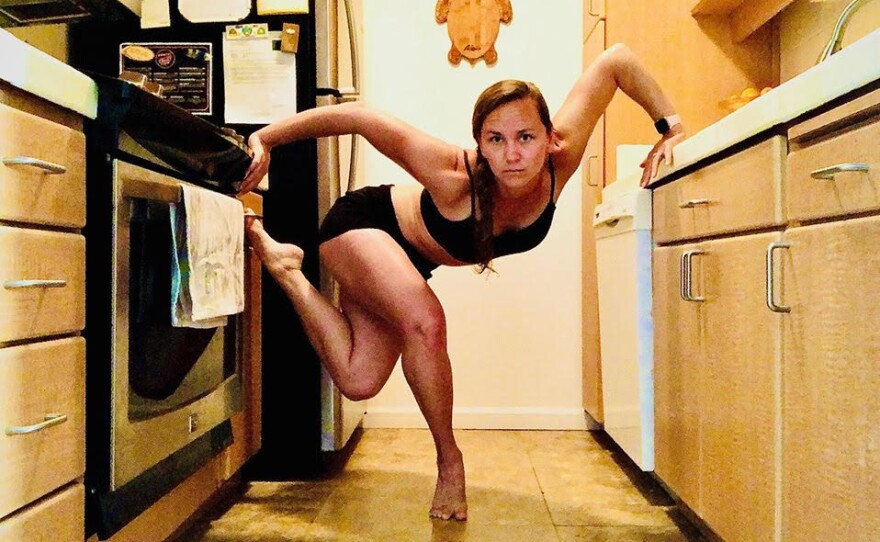There's a good chance that the days of PGK Dance Project's performances in the back room of Bluefoot Bar in North Park have best equipped the group for creating art during a pandemic.
"We had that backroom program for three years and everyone was confined to this 4 x 4 platform, where their work had to live, no matter what they were doing," said Peter Kalivas, founder and director of PGK Dance. In their new project, "While We Were Home," there's a similar reliance on confines and restraints to spur creativity.
As the group began working on the project, Kalivas taught the six dancers the same choreographed phrase — over Zoom — and they each selected a room in their home. Then, over the course of six weeks of remote one-on-one training, he'd work with each dancer on editing the phrase and customizing it specifically for that dancer, in that particular room, with whatever furniture (or in one case, a shower) is in the way.
Despite the popularity of "site-specific" dance, Kalivas intentionally hadn't referred to anything they'd done before as site-specific work, until this pandemic. He prefers the expression "creative placemaking," which evokes more of a disruption of a natural use of a space, like interrupting a parking lot with dance or other sort of pop-up project.
But to be truly site-specific, he said, it has to be work that is inspired by a space, and only truly able to be performed in that place.
Take Sarah Emmons' small, in-kitchen dining table, for example.
The performance begins outside her home, with the camera trained on her through the window, seated at the table. It feels almost voyeuristic and implicating, like the audience is uninvited.
The status quo of being an audience is another thing Kalivas wants to challenge. Even pre-pandemic, he aimed to avoid what he would call "sit and stare" experiences with art, and tried to involve the audience as much as possible. The company will kick off the "While We Were Home" presentation with a live, at-home, audience participation segment, including a warm-up dance routine they'll teach anyone who is able.

In Emmons' kitchen, she's confined to a tiny space, her movements completely restricted by the size of the room, the furniture and the walls. While she leaps and moves around and over the table, the audience is torn between watching her mesmerizing movements or letting our eyes catch on everyday items in her kitchen — food on cutting boards, a vacuum mount attached to the wall, washing machines, etc.
As the piece cycles through the other performers, we're invited in each space this time, inside bathrooms, bedrooms, living rooms, backyards. Dancer Kymmie Kellems wedges herself between the stove and cabinets in a galley-style kitchen. To an uncritical eye, the movements are unrecognizable as being rooted in the same choreographic phrasing as the others. Each dancer seems to be doing something completely different, and therein is the magic of site-specific work.
Later, we're returned to Emmons' kitchen table, but we're inside the room this time. With an almost palpable heaviness, she slumps forward on the table, before twirling herself free and pushing the table away.
In another study of the implications of being partly invited into a dancer's private life, we alternate between outdoor, through-the-window and in-the-room viewing of Marty Dorado in an unkempt bed, confined to just a tiny space and a quite unstage-like stage.
Kalivas customized the music, too, and calls on the former San Diego Opera singer Victoria Robertson for a Puccini accompaniment recorded during one of her much-loved "porch opera concerts" from her home in North Park. Robertson is set to collaborate with PGK later this year, too.
"While We Were Home" is technically more of a dance film project than a live performance, but at its heart is an undeniable immediacy. We're getting used to the intimacy of peeking in these private spaces with artists — while we, also, are in our own private homes. But with choreography that's not just site-specific but time-specific, in that it might only be performed during this moment in history, this feels like a welcome addition to the pandemic time capsule.

"This piece is what it has to be right now because of what's happening in the world," said Kalivas.
The hour-long project launches Saturday, June 27 at 7:30 p.m., and access to the password-protected performance costs $5. There'll be a livestream intro and mocktail tutorial, recorded performance, then question and answer session. For an additional fee, Mock It, a local, non-alcoholic pop-up bar, will deliver mocktail ingredients the day before the show. Following Saturday's world premiere, the dance segment of the project will be available for viewing on demand.






